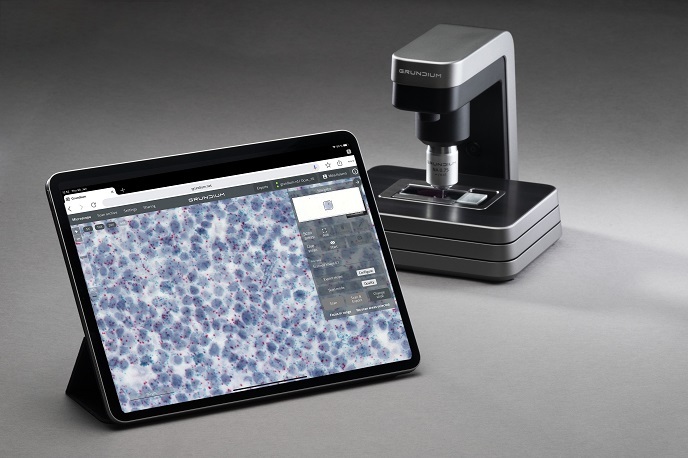An easy-to-use, portable microscope scanner for telepathology
Pathologists routinely employ conventional microscopy to examine the gross anatomy of a specimen, the appearance and chemical signature of cells. In certain instances, such as for cancer diagnosis, they may also take into account gene markers or employ antibodies to unveil the expression pattern of disease-related biomarkers. However, the scarcity of pathologists hampers the effectiveness of pathology-associated disease diagnosis.
Proprietary technology for a portable microscope scanner
To address this problem, scientists of the EU-funded GRUNDIUM(opens in new window) project propose digital and remote pathology as the way forward. “The majority of clinical labs today don’t have the necessary technology for digital pathology and rely on error-prone manual methods and on locally available pathology expertise,” explains project coordinator Mika Kuisma. As a solution to the expensive and cumbersome microscopes available today, GRUNDIUM has designed and built portable microscope scanners. The project team consists of former leading innovators from Nokia and Microsoft who have created a disruptive technology that enables the scanning of slides and supports telepathology(opens in new window). Apart from assisting remote work, the GRUNDIUM microscope scanner fits in any workflow and produces high-quality images. It pairs with any device with internet connection and the generated images can swiftly be shared online to a pathology expert or for getting a second opinion. The scanner is used with a web application which communicates through an interface guaranteeing data privacy and security. The plugin framework supports almost any protocol for relaying either streamed or exported images. Importantly, using the GRUNDIUM microscope scanner is easy and requires only 15 min of training. Slide scanning is fast, providing the opportunity to run several units in parallel for high-throughput processing. It is especially suitable for applications where results are needed fast, even in real time such as in a clinical environment where intraoperative diagnosis is necessary.
GRUNDIUM scanner: the future of digital pathology
An important feature of the GRUNDIUM technology is that it can support artificial intelligence (AI)-based diagnosis. As Kuisma outlines: “AI can do the tedious part of the work, like counting nuclei or spotting anomalies in dozens of slides so the expert only needs to examine the important images.” The GRUNDIUM scanner offers the reliability, image sharpness and ease-of-use required for these AI solutions. Partners’ vision is to help people all over the world get better healthcare through access to professional diagnosis. Digital pathology – the conversion of physical specimen to digital slides – enables medical professionals work more effectively and serve more patients remotely. This is the future of disease diagnosis. In collaboration with Harvard Medical School(opens in new window) and Massachusetts General Hospital(opens in new window) in the United States, GRUNDIUM is participating in molecular pathology studies in Boston and on a project in Uganda to help train the local pathologists. Moreover, Karolinska Institute(opens in new window) is implementing the GRUNDIUM microscope scanner in a remote, cervical cancer screening project in Kenya. GRUNDIUM are partnering with other companies in the value chain and developing full solutions for various needs. Working with one of the world’s biggest, animal health companies has led to the development of a point-of-care, fully automated test solution for veterinary clinics.







